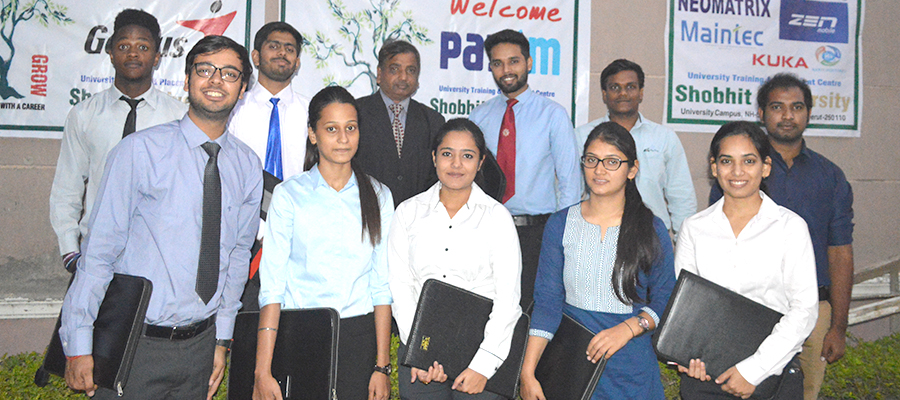University Training & Placement Centre has devised strategy known as “Industry Engagement Initiative” which is actually an internship program. The serious issue in India has been that the higher education sector and the industrial sector have worked in isolation from each other. One of the reasons behind the talent crunch is the significant industry-academia divide. This has resulted in two extremes.
On one hand, the industry needs talent and on the other hand there is an abundance of engineers who don't have industry oriented necessary skills. Today, when Indian higher education sector is poised on the verge of liberalization, role of industry would be crucial in taking the Indian education system to a higher trajectory.
India-Turning potential into reality
Indian economy is experiencing an accelerated growth. The World Development Report emphasizes that in India the situation of increasing youth population presents an unprecedented opportunity to accelerate growth and reduce poverty.
India has a huge brand name internationally in supplying skilled manpower. According to one estimate, at any point of time, around five million Indians work abroad. With its demographic advantage and the large pool of English speaking people, India can well provide the solution to the world's skills shortage problem.
It is widely recognized that knowledge, skills, and resourcefulness of people are critical to sustain development, economic, and social activity in a knowledge society. Given the current high-paced growth and dynamic investment climate in India, the demand for knowledge workers with high levels of technical and soft skills will only increase. With expansion taking place across sectors: banking and financial services, retail, manufacturing, pharma, outsourcing / offshore companies, service providers, etc there already exists a large need for IT talent.
However, over the past fifteen years, India has produced 1.6 million professionals and faced the uphill task of producing another 0.8 million. But, what is needed is a holistic approach to address the problem of skills shortage within the country
In many countries, building a workforce with higher order skills is an important part of improving the climate for investment, acquiring a competitive edge and generally maintaining an engine of growth. Higher education enhances earnings of the individuals and contributes to economic development and makes a significant contribution to reduction in absolute as well as relative poverty. The progress, prosperity and accelerated growth in economy require support from the higher education system in providing an uninterrupted supply of a skilled and efficient workforce.
The Challenge a head
If India is to attain its goal of becoming a global economic power, it needs people of caliber to power and accelerate growth. Even with Initiatives from Government if things progress as they are, India is certain to face a 'talent gap'- the lack of right skills for the job required. Almost two decades into India's phenomenal growth as an international centre for high technology, the industry has a problem, it's running out of talent.
According to a McKinsey report, Indian universities churn out 400,000 new engineers every year, but only 100,000 are ready to join the IT industry. For the semiconductor industry in India, availability of 'employable' talent is even worse, especially for high-end technology areas such as VLSI and embedded design. Companies in this domain need people with specific skills. With India's rising talent crunch, it will be a challenge to maintain the same competitive edge that it offered in the past. According to NASSCOM, each year over 3 million graduates and post-graduates are added to the Indian workforce.
However, of these only 25 percent of technical graduates and 10-15 percent of other graduates are considered employable by the rapidly growing IT and ITES segments. Hence, what we have today is a growing skills gap reflecting the galloping pace of the country's service-driven economy, which is growing faster than most countries in the world.
Lack of Industry engagement in Indian higher education sector has been sighted as one of the key reasons for outdated curriculum, irrelevant research initiatives, inappropriate training and mentoring of students and faculty etc. These issues have been debated endlessly on various Industry-Academia forums, however, without any viable solution. Today, when Indian higher education sector is poised on the verge of liberalization, role of industry would be crucial in taking the Indian education system to a higher trajectory.
Industry Engagement Initiative
A recent report published by the Confederation of Indian Industry and the Boston Consulting Group (BCG) has estimated that India would face 'talent gap'- the lack of right skills for the job required - of more than 5 million by 2020. The report titled,'India's Demographic Dilemma' brings out the fact that the $1.1-trillion economy will have a shortfall of 750,000 skilled workers over the next five years.
Recognizing skills needs in the context of changing scenario around the globe, the corporate sector needs to step up to the center-stage to ensure the success. Strong industry leadership and engagement with the academic institutions and Universities is essential.
The serious issue in India has been that the higher education sector and the industrial sector have worked in isolation from each other. One of the reasons behind the talent crunch is the significant industry-academia divide. This has resulted in two extremes. On one hand, the industry needs talent and on the other hand there is an abundance of engineers who don't have industry oriented necessary skills. Industry veterans term these engineers 'raw talent' and training them to make them productive is a challenge to them.
Consequently, Indian Industry is investing nearly INR 6,450 crore on training their employees. Also, 45 percent of the total amount spent on training is toward skill development of new recruits. Initiatives to narrow down the industry-academia gap have to be undertaken at the industry and University level. One way of doing this is by encouraging student internships.
Shobhit University invites industries and research organizations to mutually reinforce the process as active partners. It would add richness to the Industrial environment & work culture as well as our contribution to the national knowledge management endeavor.
Interns/Trainees are B.Tech. Final Semester Students of Shobhit University. They shall be available for Internship with the industry for a semester of Six months duration starting from 18th January, 2017.
Corporates may kindly email their requirements to utpc@shobhituniversity.ac.in

